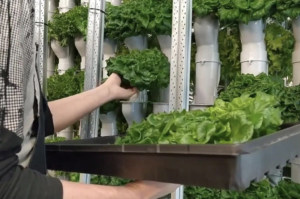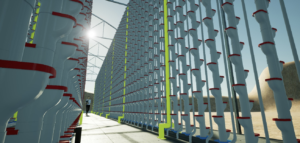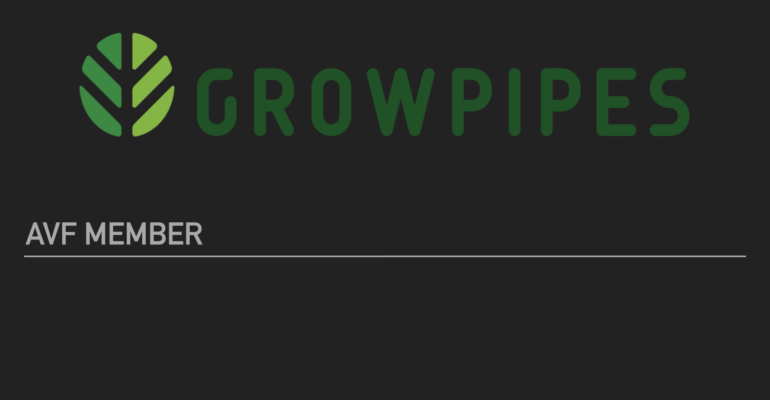The AVF is excited to welcome its new member, GROWPIPES.
GROWPIPES has developed a highly space-efficient, economically sustainable, and user-friendly vertical hydroponic system with a focus on building farms requiring minimal water use for efficient cultivation. Their solution is highly scalable and adaptable to the individual needs of businesses and growers while maintaining a low risk of leakage. With a vision to normalize this method of growing for the future and give those who need VF technology access to it, they also collaborate on projects across multiple continents.

Growpipes
CEO, Christer Tilk, and co-founder, Robert Carlsson, started out in Gothenburg, Sweden, with a vision to make a vertical farm as space-efficient as possible. They initially tested several different available prototypes but encountered issues. Christer told the AVF:
“The problem was that they were very expensive […] in some cases it made it very difficult for the water to have an even/equal flow to all plants. […] also, when it came to after-harvest maintenance, it took a very long time to clean.”
They subsequently endeavored to find another way to develop a vertical farm and struck up a collaboration with Christiaan Delport. Christiaan is a South-African born farmer who has extensive hands-on experience with hydroponics. He is also the founder of Organigro (Pty) Ltd – a company in the vertical farming sector. He was able to provide a list of specifications and describe what was needed to build a good prototype.
“I’m very happy to have Christiaan as a grower on the team to validate everything.”
Brothers, Mikael and Jonas Pari also joined the team to assist with prototype development and running the production.
GROWPIPES has created a product built in one piece, removing the need to do the work of putting it together, with a reduced risk of the leakage seen in many of the competitive pipes. The highly adaptable system allows maximization of any growing space while remaining easy to clean.
“It’s like lego for greens! You can adjust them to any height […] It’s easy to handle and, after harvest, you can take the sections apart […] so it’s very easy to clean.”
They received their patent in May 2020.
“Since [August 2020] we have been test-producing this pipe […]it works very very well, and the result is great…”
Christiaan told the AVF:
“This system…you can do it inside your house. You can do it against a wall outside your house. You can do it in a grocery shop in the vegetable isle…It’s a system that can work everywhere! It’s not only for the growers…”

Growpipes
Christiaan started out with food production for animals but planting in the ground in Africa/South Africa is problematic due to there being so little rain. He initially turned to using an indoor growing room with LEDs, but that too is problematic due to South Africa’s unreliable and expensive electricity supply.
“There is too little electricity for all the people. For the next few months, we’re going to spend at least 2 and a half to 5 hours per day without electricity.”
In South Africa, there is, however, a lot of sunlight. Therefore, Christiaan and his team use the GROWPIPES hydroponics system in combination with solar power and have the farm set up to carry out most tasks during the day, when there is sunlight, and to use very little electricity at night. At this stage, the farm is about 3000 square meters with about 180,000 plants widely spaced for the sun to reach the bottom. Another GROWPIPES user in Sweden, where sunlight is a limiting factor rather than electricity, uses LEDs in a more traditional compact space with movable rows for access during planting and harvesting, demonstrating the flexibility of the system to accommodate different requirements.

Growpipes
“I tell you…the guys from Sweden – I’m so proud of them. They did an excellent job.”
Christiaan is excited about the prospects of releasing Africa’s untapped potential for food production with the help of this technology:
“My vision is closer to the small towns in Africa (closer to the towns supplying food to the people in that community) but also exporting. So, you not only make enough for the community but more so you can export and get foreign capital into the country and the village. My focus will be Africa, definitely.”
Christer commented:
“It’s fantastic and I think it’s such a beautiful joint venture between Sweden and South Africa. It’s a completely different market and set-up and, yes we have our indoor controlled idea – how to do it all seasons – but of course, Christiaan makes use of the sun, which is very reasonable.”

GROWPIPES is involved in and always looking for projects and people throughout the world who need VF technology, and they want to spread the word to normalize this way of growing. Presently, they are involved in projects with Jute from Bangladesh.
“If there are any farmers in any place, we can also assist in putting the project together with a lot of experience in project management to create the most affordable solution for that project.”
Additionally, there is a chain of about 30 high schools around Sweden that are using the GROWPIPES system to educate their students. They also put up a wall in a residential building for a housing project so the residents could pick their own herbs and salads, demonstrating how the gap between the source and consumer in the food supply chain could be closed for fresher and more nutritious, and sustainable produce.
“Here up in the North we are trying to show that many of the salads and green leaves we eat during the off-season are imported […] we are probably eating something that’s 7-8 days old […] this is a very easy way to convince people up here.”
VF technology removes the necessity for pesticide use and putting chemical nutrients in the soil, which is great news for our ecosystems that have been damaged by traditional farming practices. In hydroponics, the nutrients remain in the hydroponics system, preventing runoff, and can be optimized for plant health and better-quality produce. Christiaan added:
“If you can teach the people that I can control the taste, I can give [the plants] optimal nutrients, your product is going to be much better, much cleaner […] I don’t call it organic, I call it beyond organic.”
Christer and Christiaan are enormously passionate about their work and positive about how GROWPIPES can actively help create profitable farms and generate opportunities, supporting the integration of VF technology and its innumerable benefits into the daily lives of our rapidly growing populations. Christer concluded:
“There are so many different options. We just need to find a way to get this out and find new collaborations with other companies maybe…other ideas too…we are a part of something bigger.”
Author: Laura Nelson


Comments are closed.